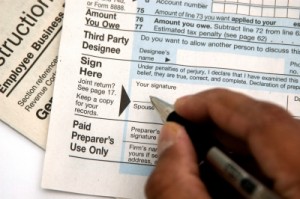Federal income tax filing: 5 common mistakes -- and what they can cost you
By Peter Andrew

Long before he became a cop, Kevin was my best friend. So when he joined the police, it seemed natural that I'd often join him and his colleagues for an after-work drink. They were a great bunch, and I really enjoyed the time I spent with them. But as they told their job-related stories, I'd frequently think to myself how much I enjoyed being their friend, and how little I'd like to meet them professionally.
I don't know any IRS agents, but I suspect that the same would apply. They're probably charming people socially, but you really, really don't want to spend time with them when they're working.
Luckily, there are simple things you can do when filing your federal income tax return that can help you avoid finding out whether I'm right.
Beware of these 5 common mistakes to avoid Tax Trouble
Here are five common mistakes routinely made on taxes, and how they can be avoided:
- You didn't double check
Among the most common federal income tax filing mistakes are some that are so embarrassingly elementary that you wouldn't want to admit to them outside a confessional. So, before mailing your return, ask yourself these three questions:
- Have I signed and dated the form?
- Have I entered and triple-checked my social security number?
- Have I attached Copy B of the W-2 form(s) my employer(s) sent me?
- You got the math wrong
According to the IRS, the most common mistake of all is people making basic errors in their arithmetic. You can minimize the chances of this happening by finding the best tax preparation software (or the best online tax software) for your needs, and using that. And, of course, you can file online now. If none of those appeal, why not create a spreadsheet that will do the math automatically, and then transcribe the figures?
If you are a complete technophobe, you should use a calculator (oh, come on--you can manage that), triple-check your sums, and preferably have someone else check for errors.
- You failed to report all of your income
Whenever you ask yourself whether you need to declare a particular sort of income, your default answer should be "Yes." It's true that in limited cases it can be "No," but don't make assumptions. Instead, consult the IRS 2010 Publication 525--Taxable and NonTaxable Income.
Be sure not to forget unearned income. Your bank and other financial services suppliers should have informed the IRS of how much you've received, so you can expect consequences if you don't report this.
- You were over or under with your tax deductions
As Gerald Barzan observed:"Taxation with representation ain't so hot either." And the last thing you want to do is pay more than your due. But, if you deduct items that you shouldn't, you risk a big financial penalty or even jail.
If your financial affairs are sufficiently complicated that there's a chance you're getting your tax deductions seriously wrong, you should probably consider paying a professional both to advise you, and to take over the donkey work. Depending on your circumstances, a good one may well save you way more than his or her fee.
- You Forgot to file on time
If you're late filing, you'll automatically be charged penalties, unless you can show good cause for your failure. For example, if you're 60 days late, you'll have to pay at least $100, and possibly much more.
However, if you need more time to file and don't want to pay a penalty, you can apply for an extension in advance by completing and returning Form 4868 - Application for Automatic Extension of Time to File U.S. Individual Income Tax Return.
Federal income tax errors can be costly
Making innocent mistakes with your federal income tax return can be expensive. You could be stung $50 just for putting in the wrong social security number. If you file a "frivolous" return (one that clearly lacks the information to make a proper assessment), you could face a $500 penalty.
But that's just the beginning. In addition, you could be liable to pay 0.5 percent a month for each month or part thereof when you have tax liabilities that are overdue as a result of incorrectly filing. And there's a further--potentially even stiffer--penalty for filing late.
Of course, those penalties are for innocent mistakes. Try to defraud the IRS, and you could have limitless opportunities to test my theory about how charming its agents are during audits.
And you're unlikely to be invited out for drinks--even after you get out of the penitentiary.
Peter Andrew has been writing about--and for--business for more than two decades. For the last few years, he has found himself increasingly specializing in the U.S. financial sector.
January 1, 1970 at 12:00 am